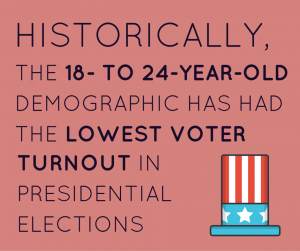Lehigh’s political atmosphere can be described in one word: quiet.
Ted Morgan, a political science professor, said that segments of campus occasionally fire up to defend close-to-home issues like gender, sexuality and race. Yet, other aspects of political awareness are often ignored.
“College is a bubble,” Morgan said. “The environment does not reinforce paying attention to outside the bubble.”
Historically, the 18- to 24-year-old demographic has the lowest voter turnout in presidential elections. Moreover, according to the U.S. Census Bureau, this age group has the fewest percentage of people registered to vote at all.
Kenneth Brill, ’17, the leader of Lehigh’s College Democrats club, speculated that because many students are not from the area, they do not feel affected by the local politics of their hometown or of Bethlehem. Knowing that they will probably only be here for four years, students might not bother to register or vote in local elections.
“They don’t know how much smaller political elections and issues are really touching their lives,” Brill said.
According to Morgan, who has been teaching political science at Lehigh since 1976, the university has always been a less political campus. He said that the prevailing “corporate conservative” atmosphere at Lehigh is less likely to attract politically active students and less likely to nurture such activism in current students.
“I think students who are drawn to being active don’t find that here — they sometimes transfer out and sometimes adjust,” Morgan said.
First-year students, he noticed, often come to Lehigh more inclined to ask questions and challenge things.
“The climate here washes that away for a lot of them,” he said. “Maybe they just don’t encounter that kind of engagement.”
Brill said that when he asks his peers about political topics, most do have an opinion. Yet, he believes that no one talks about them, simply due to the topics lack of being brought up.
Brill mentioned that many Lehigh students are headed towards futures in more typically conservative sectors like business and engineering. He said that because Lehigh is an expensive school, a lot of students come from wealthier families that are demographically more conservative. The often similar backgrounds and trajectories of students creates an environment where outspoken disagreements are rare.
Barrett Miller, ’16, the leader of Lehigh’s College Republicans club, also noticed that many students feel the same way about larger political issues.
“When it comes to the smaller things or the nuances of politics, there is a lot of disagreement but people aren’t willing to be vocal about it,” Miller said. “If anything, they’ll do it from behind a computer screen.”
Morgan spoke about this idea as well, mentioning a recent panel at Lehigh on “slacktivism,” which he said was “the idea that you could click on something and sign a petition, and that’s your activism.”
However, he also pointed out that studies exist that show these slacktivists are more likely to continue their involvement in other ways.
Both Miller and Brill said that political conversations are fostered at their respective club meetings.
“Within the club we’ll disagree,” Miller said, “which is one of the most important things we do facilitate.”
College Democrats and College Republicans both primarily focus on getting club members aware, informed and involved in politics.
“I don’t care if (club members) become more Republican,” Brill said. “I’d just like to see more discussion in general, even if they don’t agree with me.”
Brill said that the clubs occasionally co-sponsor events to get a broader audience and get more people involved. Miller advised students to subscribe to news websites and media outlets to stay up-to-date on political issues, saying that activism is secondary to being an informed political participant.
Brill encouraged students to integrate new information they learn into their existing knowledge base and examine their own viewpoints critically.
“When you absorb new information, you should be asking, ‘How does this affect me?'” he said. “‘How do I feel about this? What can I learn about this?’”
Morgan advised students to look on campus and in the Bethlehem community for causes they are interested in.
“Plug in somewhere,” Morgan said. “One you plug in, you get more involved. You get a community of other people that sustains you.”






Comment policy
Comments posted to The Brown and White website are reviewed by a moderator before being approved. Incendiary speech or harassing language, including comments targeted at individuals, may be deemed unacceptable and not published. Spam and other soliciting will also be declined.
The Brown and White also reserves the right to not publish entirely anonymous comments.